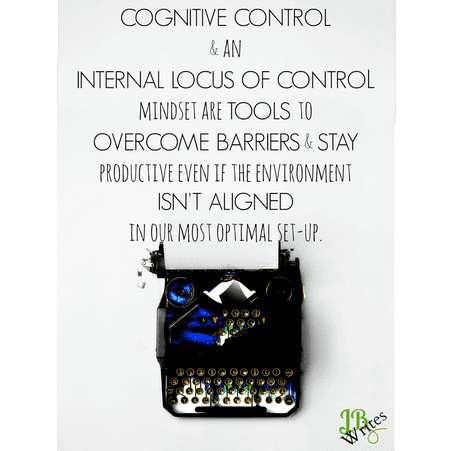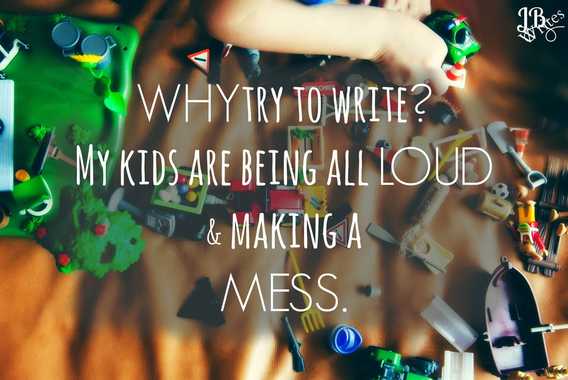In my last two posts, I talked about the benefit of ingraining a very powerful urge to write by creating a habit. Writing under the same circumstances every day for a few weeks can create stimulus control in which the environment triggers our writing behavior. But I also cautioned that we can sometimes hinder ourselves if we limit our writing to only that special circumstance. We don’t want to limit ourselves! We want to be productive no matter where we are, right? So, to avoid that, once we’ve established a good habit, we need to vary our writing environment (while still sticking with our routine) so we can train ourselves to write under a variety of stimuli. This will allow for optimal productivity.
Today, I want to add in two new concepts: cognitive control and locus of control.
Definitions
| Cognitive control refers to the way people’s behavior can be driven by mental constructs such as plans, instructions, goals, and prior events. It also refers to the way our behavior can vary in real time, allowing it to change as our plans, goals, and values (etc.) vary. This allows our behavior as a whole to be flexible instead of rigid. |
How does this all fit in with stimulus control and generalizability?
First off, we must recognize that external stimuli impact our behavior. That’s exactly why stimulus control and generalizability work, right? Whether we’re talking writing behavior, eating behavior, study habits, whether we get on Facebook or get to work on that MS instead, we can’t ignore the impact of external factors on what we do. If we try to, we’re losing out on some potentially helpful stuff and maybe even setting ourselves up for failure (like if we minimize the impact of a coworker bringing donuts to work when we’re trying to count calories).
So, step 1, just remember that external factors impact us.
External factors don’t have to be the end-all be-all of our behavior. Yes, stimulus control is powerful, but so is your brain. We need to remember that the executive control of our behavior lies within us.
All too often I hear people saying things like:
- I can’t work out today, because I got stuck in traffic. Or
- There’s no point eating a healthy lunch because I’m going to have an unhealthy dinner. Or
- There’s no point writing; I’ve only got a half hour and I need at least 45 minutes to make it work. Or
- Why try to write? My kids are being all loud and making a mess.
What do all of these situations have in common? They all are examples of external locus of control. In other words, they’re all examples of situations where we assume the external environment has the ultimate power to decide what we do.
Cognitive control is like our trump card, the one that bypasses all of these barriers. By putting the locus of control back inside us, we exert cognitive control. Instead of letting the environment drive our behavior, we can use other important stimuli to drive it instead. Stimuli like: our goals, our values, our decisions, our plans, our prior preparations, the deadline we committed to with our editor/agent/critique partner.
Your comfy chair and tatty robe won’t write your story for you, right? YOU write your story. And you can do it whether you’re in the perfect spot or in your really uncomfortable work clothes or surrounded by a lot of distraction or with a glass water instead of a huge-ass mug of coffee or jazz instead of polka (you know who you are).
No matter how powerful the stimuli in our environments, we are always the ones with the executive control. We are in the driver’s seat. We get to veto all the other stuff and put our brains to work for us. So, when I use the mantra shared with me by my dear friend, You can do it! You can write!, I’m literally invoking our powers of cognitive control.
| This concludes my mini-series on stimulus control and generalizability. How will you put these powerful psychological tools to work for you and your writing? Feel free to leave a post in the comments and share. Thanks to Amber Gregg for hosting my posts on her fabulous site, “Judging More than Just The Cover,” and don’t forget…You can do it! You can write! |





 RSS Feed
RSS Feed
